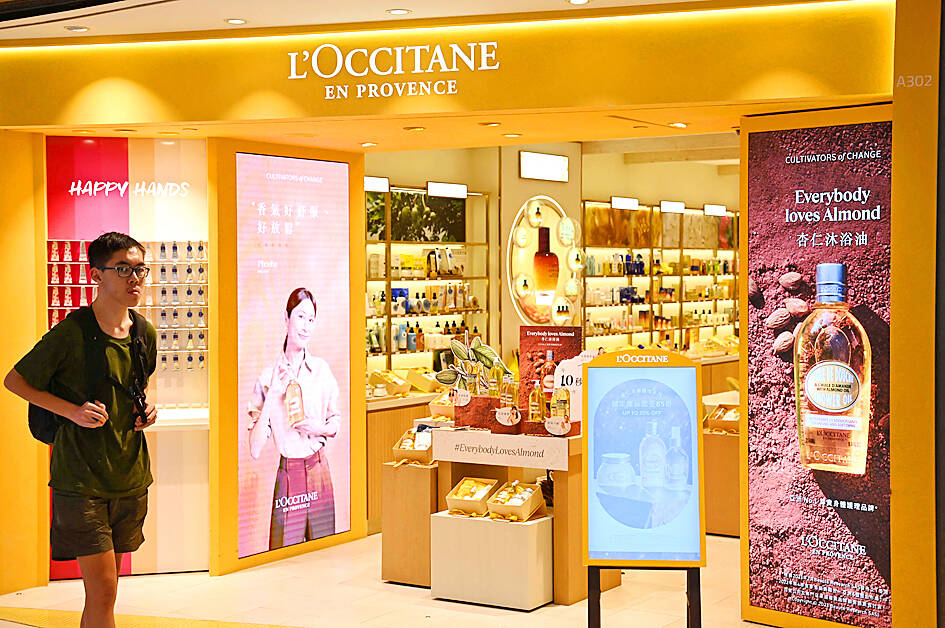Trading in French beauty brand L’Occitane was halted in Hong Kong after reports emerged that its controlling shareholder might turn the company private.
The luxury retailer, known for its skincare products and fragrances, raised more than US$700 million in its Hong Kong initial public offering in 2010, buoyed by optimism over the booming Chinese consumer market.
Bloomberg News said in July that L’Occitane International SA chairman Reinold Geiger was looking into the possibility of taking the company private, including discussions for a potential take-private offer of as much as HK$35 per share.

PHOTO: AFP
Geiger ultimately controls L’Occitane, owning more than 70 percent of the company, and has been speaking to advisers about the possibility of relisting the firm on a European exchange as soon as next year, Bloomberg News said.
L’Occitane announced yesterday that its Hong Kong-listed stocks would be suspended “pending the publication of an announcement pursuant to the Code on Takeovers and Mergers” an exchange filing showed.
The firm, headquartered in Luxembourg and Geneva, Switzerland, said last month it was considering a possible take-private deal with an offer price of no less than HK$26 per share, but “has not received any firm offer” at the time.
It closed at HK$27.80 on Thursday last week, with the market halting trading the following day due to a typhoon.
L’Occitane’s stock price was flat for the first half of the year before spiking about 40 percent in late July.
The brand’s listing in Hong Kong came at a time when Western brands were seeking new ways to tap the growing Chinese consumer market.
Taking the company private would add to a series of similar deals in Hong Kong as valuations remain depressed. Chinese snack maker Dali Foods Group Co (達利食品) received a take-private proposal from its controlling shareholder in June, and big-screen cinema company Imax Corp is also seeking to take full control of its listed Chinese business.

BIG BUCKS: Chairman Wei is expected to receive NT$34.12 million on a proposed NT$5 cash dividend plan, while the National Development Fund would get NT$8.27 billion Taiwan Semiconductor Manufacturing Co (TSMC, 台積電), the world’s largest contract chipmaker, yesterday announced that its board of directors approved US$15.25 billion in capital appropriations for long-term expansion to meet growing demand. The funds are to be used for installing advanced technology and packaging capacity, expanding mature and specialty technology, and constructing fabs with facility systems, TSMC said in a statement. The board also approved a proposal to distribute a NT$5 cash dividend per share, based on first-quarter earnings per share of NT$13.94, it said. That surpasses the NT$4.50 dividend for the fourth quarter of last year. TSMC has said that while it is eager

‘IMMENSE SWAY’: The top 50 companies, based on market cap, shape everything from technology to consumer trends, advisory firm Visual Capitalist said Taiwan Semiconductor Manufacturing Co (TSMC, 台積電) was ranked the 10th-most valuable company globally this year, market information advisory firm Visual Capitalist said. TSMC sat on a market cap of about US$915 billion as of Monday last week, making it the 10th-most valuable company in the world and No. 1 in Asia, the publisher said in its “50 Most Valuable Companies in the World” list. Visual Capitalist described TSMC as the world’s largest dedicated semiconductor foundry operator that rolls out chips for major tech names such as US consumer electronics brand Apple Inc, and artificial intelligence (AI) chip designers Nvidia Corp and Advanced

Saudi Arabian Oil Co (Aramco), the Saudi state-owned oil giant, yesterday posted first-quarter profits of US$26 billion, down 4.6 percent from the prior year as falling global oil prices undermine the kingdom’s multitrillion-dollar development plans. Aramco had revenues of US$108.1 billion over the quarter, the company reported in a filing on Riyadh’s Tadawul stock exchange. The company saw US$107.2 billion in revenues and profits of US$27.2 billion for the same period last year. Saudi Arabia has promised to invest US$600 billion in the US over the course of US President Donald Trump’s second term. Trump, who is set to touch

SKEPTICAL: An economist said it is possible US and Chinese officials would walk away from the meeting saying talks were productive, without reducing tariffs at all US President Donald Trump hailed a “total reset” in US-China trade relations, ahead of a second day of talks yesterday between top officials from Washington and Beijing aimed at de-escalating trade tensions sparked by his aggressive tariff rollout. In a Truth Social post early yesterday, Trump praised the “very good” discussions and deemed them “a total reset negotiated in a friendly, but constructive, manner.” The second day of closed-door meetings between US Secretary of the Treasury Scott Bessent, US Trade Representative Jamieson Greer and Chinese Vice Premier He Lifeng (何立峰) were due to restart yesterday morning, said a person familiar